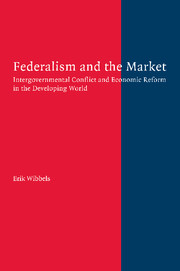Book contents
- Frontmatter
- Contents
- Acknowledgments
- 1 Intergovernmental Bargaining and Economic Policy in Federations
- 2 From Market-Preserving to Market-Distorting Federalism: Divergent Incentives and Economic Reform in Developing Nations
- 3 Federalism and the Decentralized Politics of Macroeconomic Policy and Performance
- 4 Testing the Model: Macroeconomic Reform Beyond the Federal-Unitary Distinction
- 5 Partisan Harmony, Intergovernmental Coordination, and Market Transitions: The Case of Argentina
- 6 Regional Competition, Fiscal Dependence, and Incentives in the Argentine Provinces
- 7 The View from Below: The Politics of Public Sector Reform in Three Argentine Provinces
- 8 Conclusion: Federalism, Reform, and Enduring Puzzles
- References
- Index
4 - Testing the Model: Macroeconomic Reform Beyond the Federal-Unitary Distinction
Published online by Cambridge University Press: 20 July 2009
- Frontmatter
- Contents
- Acknowledgments
- 1 Intergovernmental Bargaining and Economic Policy in Federations
- 2 From Market-Preserving to Market-Distorting Federalism: Divergent Incentives and Economic Reform in Developing Nations
- 3 Federalism and the Decentralized Politics of Macroeconomic Policy and Performance
- 4 Testing the Model: Macroeconomic Reform Beyond the Federal-Unitary Distinction
- 5 Partisan Harmony, Intergovernmental Coordination, and Market Transitions: The Case of Argentina
- 6 Regional Competition, Fiscal Dependence, and Incentives in the Argentine Provinces
- 7 The View from Below: The Politics of Public Sector Reform in Three Argentine Provinces
- 8 Conclusion: Federalism, Reform, and Enduring Puzzles
- References
- Index
Summary
The previous chapter and a growing body of research suggest that federalism in the developing world does not conform to the market-preserving ideal. Consistent with the poor economic reputation of federalism in places such as Russia, Argentina, and Brazil, it seems that the political and economic institutions characteristic of federalism have undermined the capacity of some developing nations to institute the lasting economic reforms that contribute to macroeconomic stability (Tanzi 1995; Treisman 1999c; Jones, Sanguinetti, and Tommasi 2000; Remmer and Wibbels 2000). Even in cases in which national policy makers have succeeded in initiating reform, macroeconomic indicators have masked destabilizing economic fragilities at the subnational level that threaten to stall, prolong, or reverse the gains achieved at the national level (Dillinger and Webb 1999; Remmer and Wibbels 2000). The prevalence of these common characteristics is not to suggest that uniformly identical processes pervade each and every federal system under consideration. Indeed, the macroeconomic experiences of the federal nations in the developing world have varied along a continuum ranging from relatively poor in Brazil throughout the 1980s and much of the 1990s to impressive policy management in Malaysia. This variation in economic outcomes is more than matched in the heterogeneity of federal institutions across nations in the developing world. As Stepan notes, there is “immense variation that exists within democratic federal systems.” To date, little research has systematically compared the impact of variations in federal politics and institutions on macroeconomic policy making and performance.
- Type
- Chapter
- Information
- Federalism and the MarketIntergovernmental Conflict and Economic Reform in the Developing World, pp. 86 - 122Publisher: Cambridge University PressPrint publication year: 2005



